Psychology: Analyzing Perspectives on Emotional Experience
VerifiedAdded on 2020/10/22
|11
|2860
|288
Essay
AI Summary
This essay provides a comprehensive overview of psychological perspectives on emotional experience. It begins with an introduction to psychology and its focus on the human mind and behavior, then delves into four key perspectives: behavioral, cognitive, biological, and sociological. Task 1 reviews the main theories associated with each perspective, including classical and operant conditioning, Piaget's cognitive development, and the influence of genetics and society. Task 2 analyzes how each theory attempts to understand emotional experience, while Task 3 compares these explanations. Finally, Task 4 assesses the importance of each perspective in terms of its influence on changing human behavior. The essay highlights the varying degrees to which each perspective can shape behavior, concluding with a discussion of their relative impacts. This assignment provides valuable insights into the multifaceted nature of human emotions and the diverse approaches used to study them.
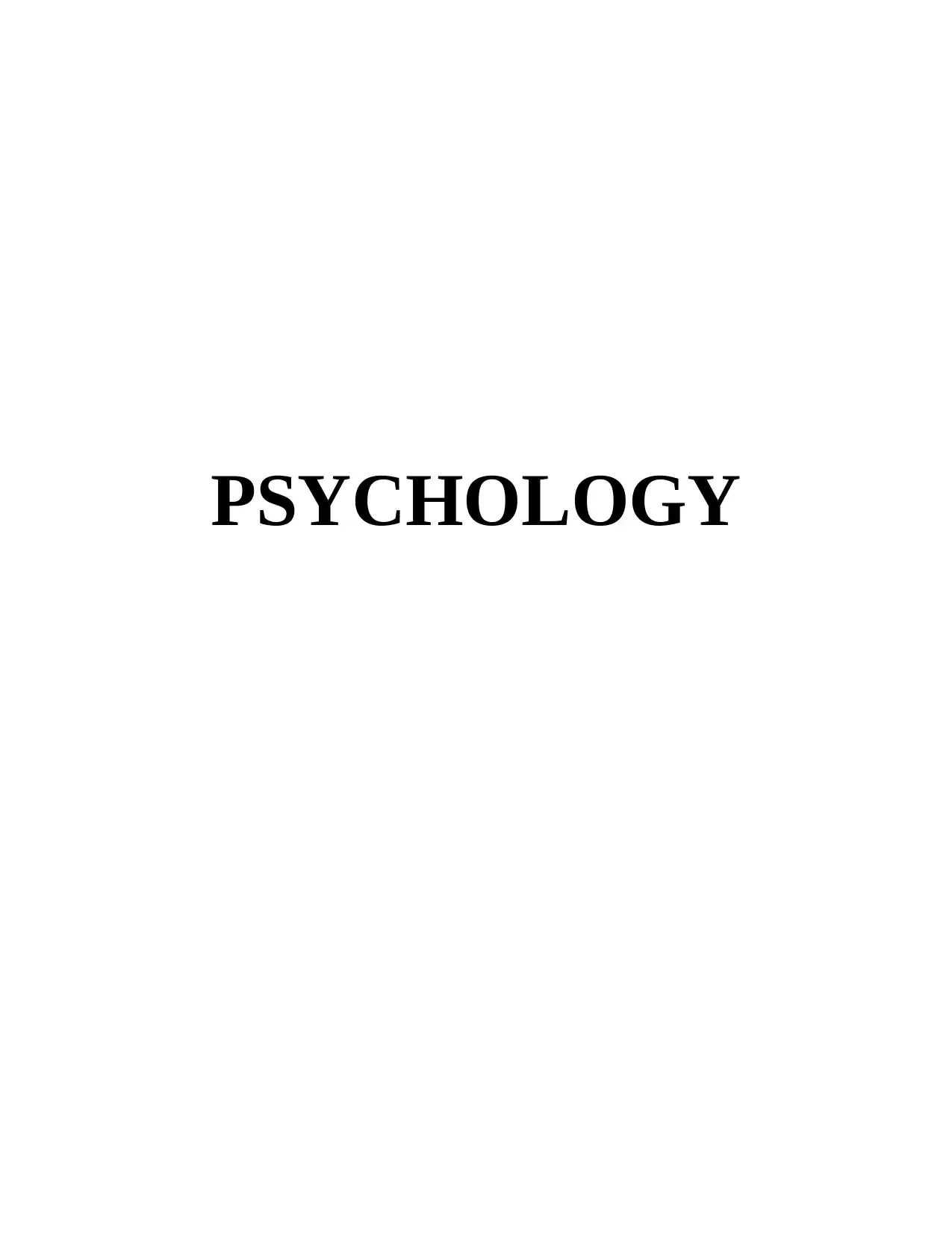
PSYCHOLOGY
Paraphrase This Document
Need a fresh take? Get an instant paraphrase of this document with our AI Paraphraser
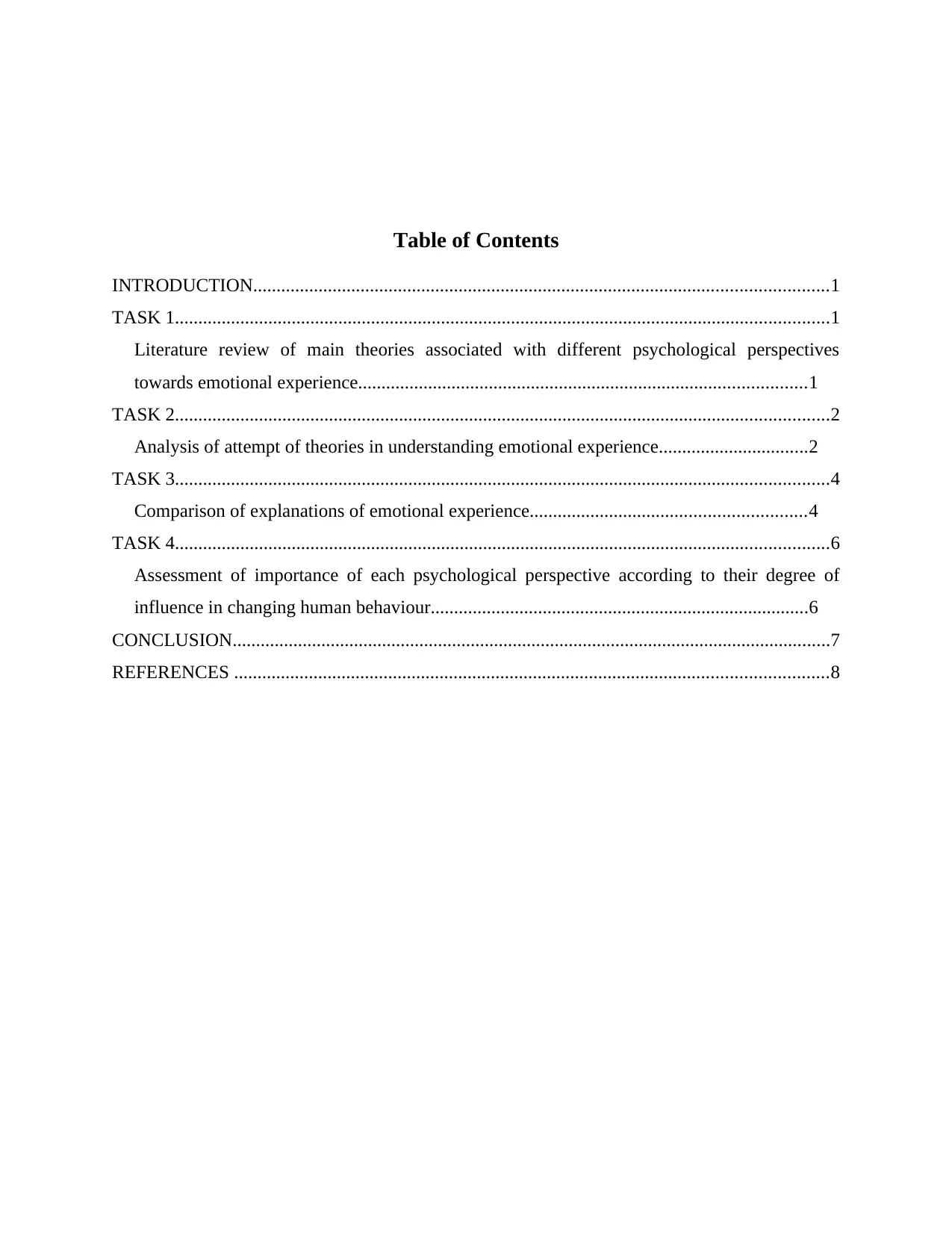
Table of Contents
INTRODUCTION...........................................................................................................................1
TASK 1............................................................................................................................................1
Literature review of main theories associated with different psychological perspectives
towards emotional experience................................................................................................1
TASK 2............................................................................................................................................2
Analysis of attempt of theories in understanding emotional experience................................2
TASK 3............................................................................................................................................4
Comparison of explanations of emotional experience...........................................................4
TASK 4............................................................................................................................................6
Assessment of importance of each psychological perspective according to their degree of
influence in changing human behaviour.................................................................................6
CONCLUSION................................................................................................................................7
REFERENCES ...............................................................................................................................8
INTRODUCTION...........................................................................................................................1
TASK 1............................................................................................................................................1
Literature review of main theories associated with different psychological perspectives
towards emotional experience................................................................................................1
TASK 2............................................................................................................................................2
Analysis of attempt of theories in understanding emotional experience................................2
TASK 3............................................................................................................................................4
Comparison of explanations of emotional experience...........................................................4
TASK 4............................................................................................................................................6
Assessment of importance of each psychological perspective according to their degree of
influence in changing human behaviour.................................................................................6
CONCLUSION................................................................................................................................7
REFERENCES ...............................................................................................................................8

⊘ This is a preview!⊘
Do you want full access?
Subscribe today to unlock all pages.

Trusted by 1+ million students worldwide
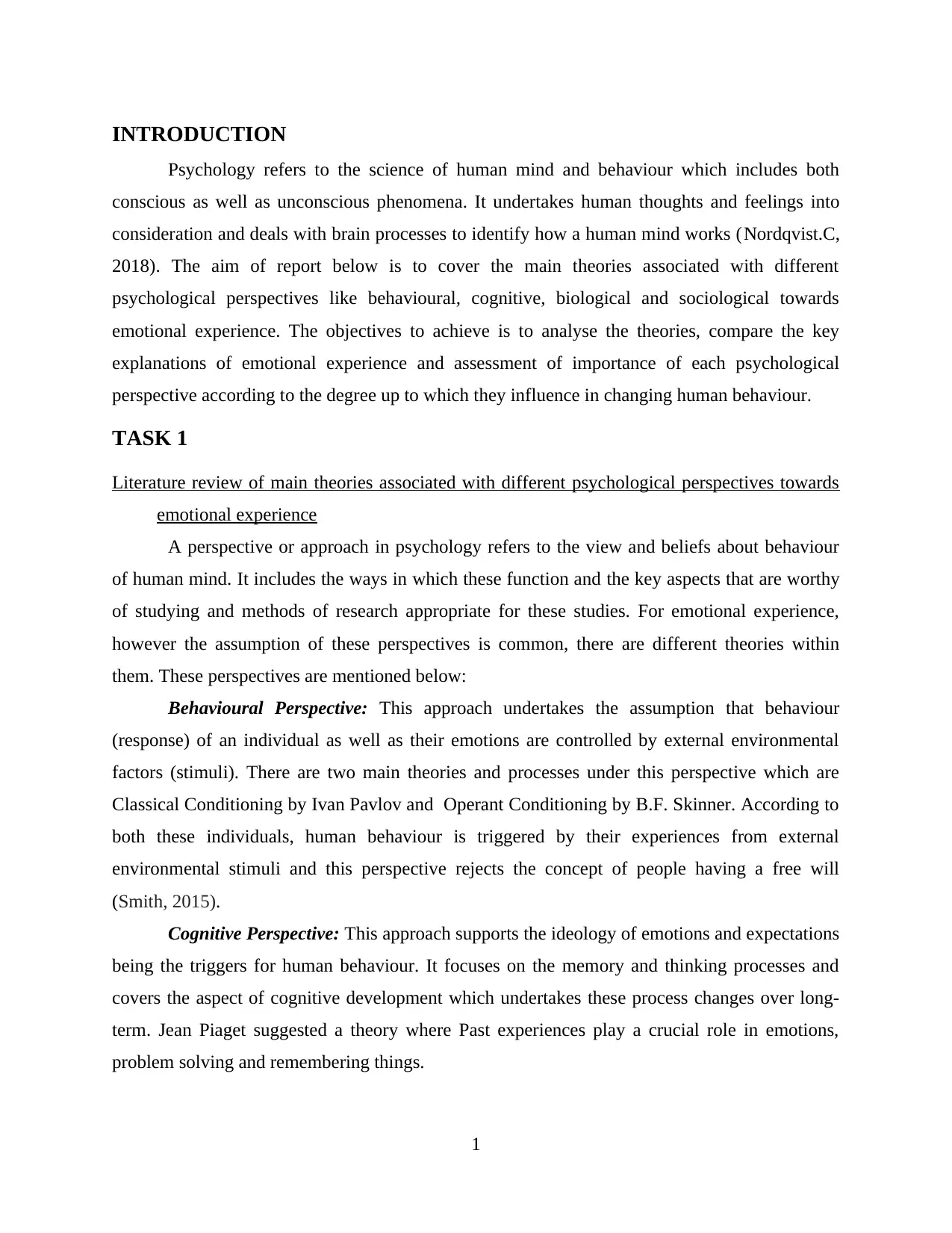
INTRODUCTION
Psychology refers to the science of human mind and behaviour which includes both
conscious as well as unconscious phenomena. It undertakes human thoughts and feelings into
consideration and deals with brain processes to identify how a human mind works (Nordqvist.C,
2018). The aim of report below is to cover the main theories associated with different
psychological perspectives like behavioural, cognitive, biological and sociological towards
emotional experience. The objectives to achieve is to analyse the theories, compare the key
explanations of emotional experience and assessment of importance of each psychological
perspective according to the degree up to which they influence in changing human behaviour.
TASK 1
Literature review of main theories associated with different psychological perspectives towards
emotional experience
A perspective or approach in psychology refers to the view and beliefs about behaviour
of human mind. It includes the ways in which these function and the key aspects that are worthy
of studying and methods of research appropriate for these studies. For emotional experience,
however the assumption of these perspectives is common, there are different theories within
them. These perspectives are mentioned below:
Behavioural Perspective: This approach undertakes the assumption that behaviour
(response) of an individual as well as their emotions are controlled by external environmental
factors (stimuli). There are two main theories and processes under this perspective which are
Classical Conditioning by Ivan Pavlov and Operant Conditioning by B.F. Skinner. According to
both these individuals, human behaviour is triggered by their experiences from external
environmental stimuli and this perspective rejects the concept of people having a free will
(Smith, 2015).
Cognitive Perspective: This approach supports the ideology of emotions and expectations
being the triggers for human behaviour. It focuses on the memory and thinking processes and
covers the aspect of cognitive development which undertakes these process changes over long-
term. Jean Piaget suggested a theory where Past experiences play a crucial role in emotions,
problem solving and remembering things.
1
Psychology refers to the science of human mind and behaviour which includes both
conscious as well as unconscious phenomena. It undertakes human thoughts and feelings into
consideration and deals with brain processes to identify how a human mind works (Nordqvist.C,
2018). The aim of report below is to cover the main theories associated with different
psychological perspectives like behavioural, cognitive, biological and sociological towards
emotional experience. The objectives to achieve is to analyse the theories, compare the key
explanations of emotional experience and assessment of importance of each psychological
perspective according to the degree up to which they influence in changing human behaviour.
TASK 1
Literature review of main theories associated with different psychological perspectives towards
emotional experience
A perspective or approach in psychology refers to the view and beliefs about behaviour
of human mind. It includes the ways in which these function and the key aspects that are worthy
of studying and methods of research appropriate for these studies. For emotional experience,
however the assumption of these perspectives is common, there are different theories within
them. These perspectives are mentioned below:
Behavioural Perspective: This approach undertakes the assumption that behaviour
(response) of an individual as well as their emotions are controlled by external environmental
factors (stimuli). There are two main theories and processes under this perspective which are
Classical Conditioning by Ivan Pavlov and Operant Conditioning by B.F. Skinner. According to
both these individuals, human behaviour is triggered by their experiences from external
environmental stimuli and this perspective rejects the concept of people having a free will
(Smith, 2015).
Cognitive Perspective: This approach supports the ideology of emotions and expectations
being the triggers for human behaviour. It focuses on the memory and thinking processes and
covers the aspect of cognitive development which undertakes these process changes over long-
term. Jean Piaget suggested a theory where Past experiences play a crucial role in emotions,
problem solving and remembering things.
1
Paraphrase This Document
Need a fresh take? Get an instant paraphrase of this document with our AI Paraphraser
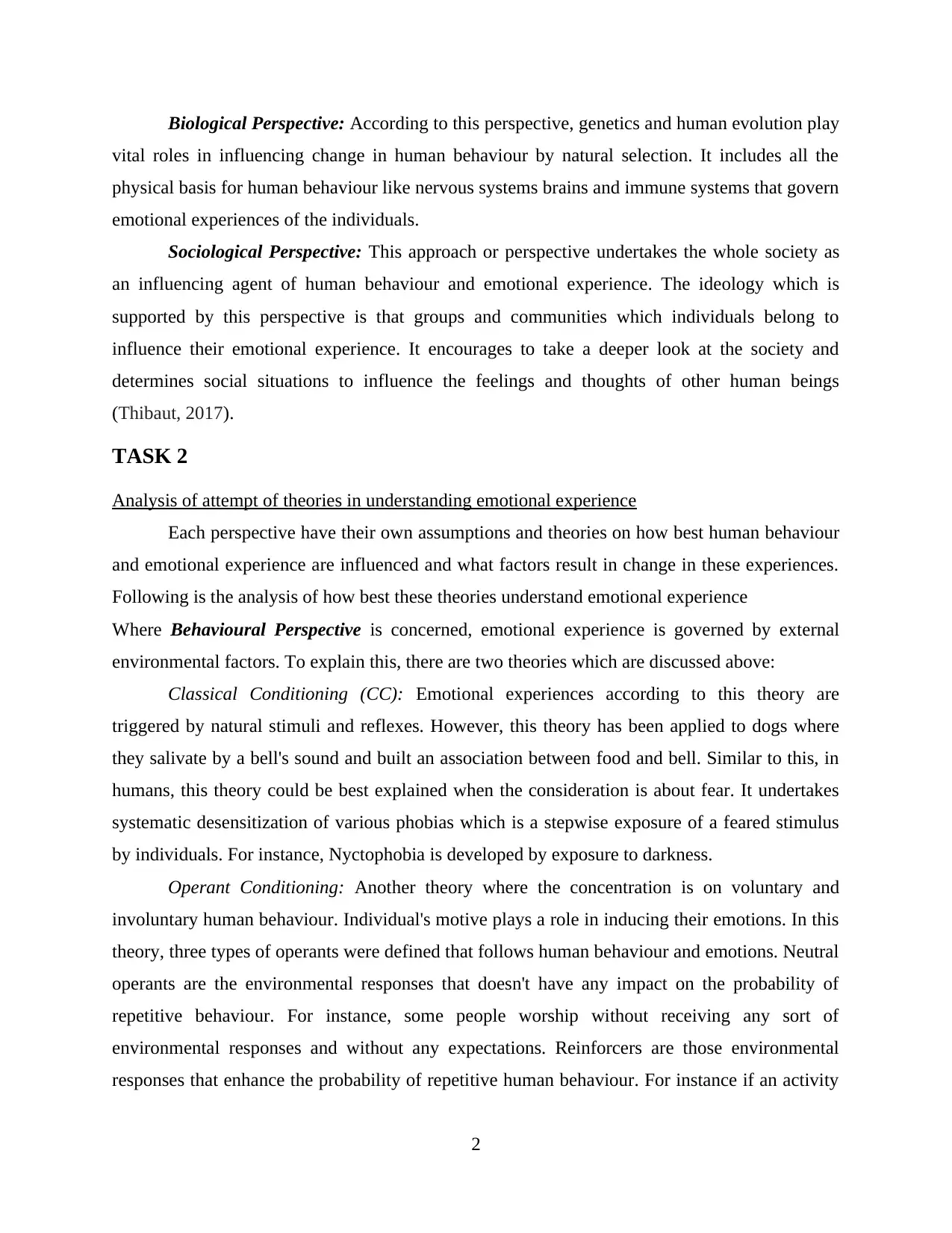
Biological Perspective: According to this perspective, genetics and human evolution play
vital roles in influencing change in human behaviour by natural selection. It includes all the
physical basis for human behaviour like nervous systems brains and immune systems that govern
emotional experiences of the individuals.
Sociological Perspective: This approach or perspective undertakes the whole society as
an influencing agent of human behaviour and emotional experience. The ideology which is
supported by this perspective is that groups and communities which individuals belong to
influence their emotional experience. It encourages to take a deeper look at the society and
determines social situations to influence the feelings and thoughts of other human beings
(Thibaut, 2017).
TASK 2
Analysis of attempt of theories in understanding emotional experience
Each perspective have their own assumptions and theories on how best human behaviour
and emotional experience are influenced and what factors result in change in these experiences.
Following is the analysis of how best these theories understand emotional experience
Where Behavioural Perspective is concerned, emotional experience is governed by external
environmental factors. To explain this, there are two theories which are discussed above:
Classical Conditioning (CC): Emotional experiences according to this theory are
triggered by natural stimuli and reflexes. However, this theory has been applied to dogs where
they salivate by a bell's sound and built an association between food and bell. Similar to this, in
humans, this theory could be best explained when the consideration is about fear. It undertakes
systematic desensitization of various phobias which is a stepwise exposure of a feared stimulus
by individuals. For instance, Nyctophobia is developed by exposure to darkness.
Operant Conditioning: Another theory where the concentration is on voluntary and
involuntary human behaviour. Individual's motive plays a role in inducing their emotions. In this
theory, three types of operants were defined that follows human behaviour and emotions. Neutral
operants are the environmental responses that doesn't have any impact on the probability of
repetitive behaviour. For instance, some people worship without receiving any sort of
environmental responses and without any expectations. Reinforcers are those environmental
responses that enhance the probability of repetitive human behaviour. For instance if an activity
2
vital roles in influencing change in human behaviour by natural selection. It includes all the
physical basis for human behaviour like nervous systems brains and immune systems that govern
emotional experiences of the individuals.
Sociological Perspective: This approach or perspective undertakes the whole society as
an influencing agent of human behaviour and emotional experience. The ideology which is
supported by this perspective is that groups and communities which individuals belong to
influence their emotional experience. It encourages to take a deeper look at the society and
determines social situations to influence the feelings and thoughts of other human beings
(Thibaut, 2017).
TASK 2
Analysis of attempt of theories in understanding emotional experience
Each perspective have their own assumptions and theories on how best human behaviour
and emotional experience are influenced and what factors result in change in these experiences.
Following is the analysis of how best these theories understand emotional experience
Where Behavioural Perspective is concerned, emotional experience is governed by external
environmental factors. To explain this, there are two theories which are discussed above:
Classical Conditioning (CC): Emotional experiences according to this theory are
triggered by natural stimuli and reflexes. However, this theory has been applied to dogs where
they salivate by a bell's sound and built an association between food and bell. Similar to this, in
humans, this theory could be best explained when the consideration is about fear. It undertakes
systematic desensitization of various phobias which is a stepwise exposure of a feared stimulus
by individuals. For instance, Nyctophobia is developed by exposure to darkness.
Operant Conditioning: Another theory where the concentration is on voluntary and
involuntary human behaviour. Individual's motive plays a role in inducing their emotions. In this
theory, three types of operants were defined that follows human behaviour and emotions. Neutral
operants are the environmental responses that doesn't have any impact on the probability of
repetitive behaviour. For instance, some people worship without receiving any sort of
environmental responses and without any expectations. Reinforcers are those environmental
responses that enhance the probability of repetitive human behaviour. For instance if an activity
2
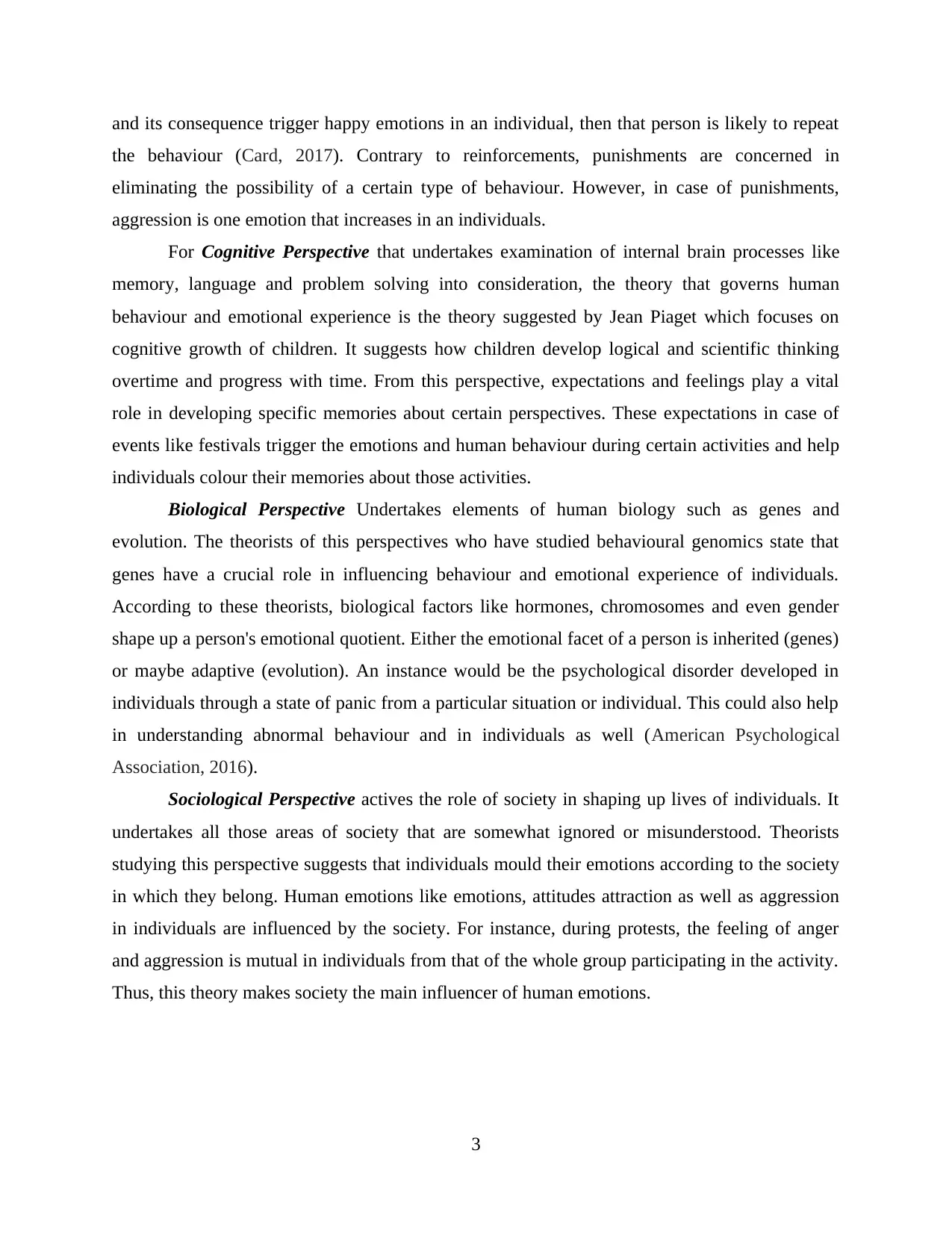
and its consequence trigger happy emotions in an individual, then that person is likely to repeat
the behaviour (Card, 2017). Contrary to reinforcements, punishments are concerned in
eliminating the possibility of a certain type of behaviour. However, in case of punishments,
aggression is one emotion that increases in an individuals.
For Cognitive Perspective that undertakes examination of internal brain processes like
memory, language and problem solving into consideration, the theory that governs human
behaviour and emotional experience is the theory suggested by Jean Piaget which focuses on
cognitive growth of children. It suggests how children develop logical and scientific thinking
overtime and progress with time. From this perspective, expectations and feelings play a vital
role in developing specific memories about certain perspectives. These expectations in case of
events like festivals trigger the emotions and human behaviour during certain activities and help
individuals colour their memories about those activities.
Biological Perspective Undertakes elements of human biology such as genes and
evolution. The theorists of this perspectives who have studied behavioural genomics state that
genes have a crucial role in influencing behaviour and emotional experience of individuals.
According to these theorists, biological factors like hormones, chromosomes and even gender
shape up a person's emotional quotient. Either the emotional facet of a person is inherited (genes)
or maybe adaptive (evolution). An instance would be the psychological disorder developed in
individuals through a state of panic from a particular situation or individual. This could also help
in understanding abnormal behaviour and in individuals as well (American Psychological
Association, 2016).
Sociological Perspective actives the role of society in shaping up lives of individuals. It
undertakes all those areas of society that are somewhat ignored or misunderstood. Theorists
studying this perspective suggests that individuals mould their emotions according to the society
in which they belong. Human emotions like emotions, attitudes attraction as well as aggression
in individuals are influenced by the society. For instance, during protests, the feeling of anger
and aggression is mutual in individuals from that of the whole group participating in the activity.
Thus, this theory makes society the main influencer of human emotions.
3
the behaviour (Card, 2017). Contrary to reinforcements, punishments are concerned in
eliminating the possibility of a certain type of behaviour. However, in case of punishments,
aggression is one emotion that increases in an individuals.
For Cognitive Perspective that undertakes examination of internal brain processes like
memory, language and problem solving into consideration, the theory that governs human
behaviour and emotional experience is the theory suggested by Jean Piaget which focuses on
cognitive growth of children. It suggests how children develop logical and scientific thinking
overtime and progress with time. From this perspective, expectations and feelings play a vital
role in developing specific memories about certain perspectives. These expectations in case of
events like festivals trigger the emotions and human behaviour during certain activities and help
individuals colour their memories about those activities.
Biological Perspective Undertakes elements of human biology such as genes and
evolution. The theorists of this perspectives who have studied behavioural genomics state that
genes have a crucial role in influencing behaviour and emotional experience of individuals.
According to these theorists, biological factors like hormones, chromosomes and even gender
shape up a person's emotional quotient. Either the emotional facet of a person is inherited (genes)
or maybe adaptive (evolution). An instance would be the psychological disorder developed in
individuals through a state of panic from a particular situation or individual. This could also help
in understanding abnormal behaviour and in individuals as well (American Psychological
Association, 2016).
Sociological Perspective actives the role of society in shaping up lives of individuals. It
undertakes all those areas of society that are somewhat ignored or misunderstood. Theorists
studying this perspective suggests that individuals mould their emotions according to the society
in which they belong. Human emotions like emotions, attitudes attraction as well as aggression
in individuals are influenced by the society. For instance, during protests, the feeling of anger
and aggression is mutual in individuals from that of the whole group participating in the activity.
Thus, this theory makes society the main influencer of human emotions.
3
⊘ This is a preview!⊘
Do you want full access?
Subscribe today to unlock all pages.

Trusted by 1+ million students worldwide
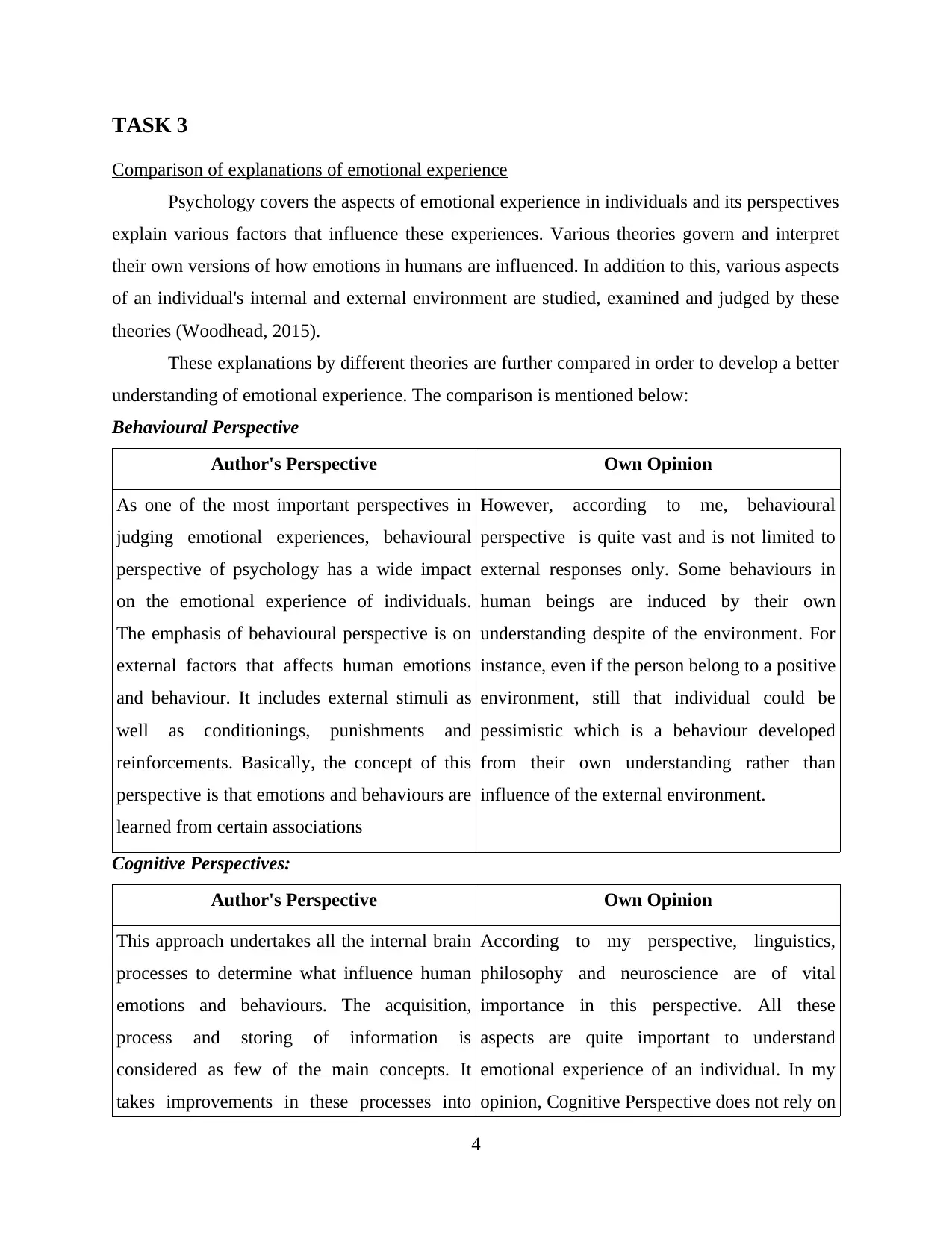
TASK 3
Comparison of explanations of emotional experience
Psychology covers the aspects of emotional experience in individuals and its perspectives
explain various factors that influence these experiences. Various theories govern and interpret
their own versions of how emotions in humans are influenced. In addition to this, various aspects
of an individual's internal and external environment are studied, examined and judged by these
theories (Woodhead, 2015).
These explanations by different theories are further compared in order to develop a better
understanding of emotional experience. The comparison is mentioned below:
Behavioural Perspective
Author's Perspective Own Opinion
As one of the most important perspectives in
judging emotional experiences, behavioural
perspective of psychology has a wide impact
on the emotional experience of individuals.
The emphasis of behavioural perspective is on
external factors that affects human emotions
and behaviour. It includes external stimuli as
well as conditionings, punishments and
reinforcements. Basically, the concept of this
perspective is that emotions and behaviours are
learned from certain associations
However, according to me, behavioural
perspective is quite vast and is not limited to
external responses only. Some behaviours in
human beings are induced by their own
understanding despite of the environment. For
instance, even if the person belong to a positive
environment, still that individual could be
pessimistic which is a behaviour developed
from their own understanding rather than
influence of the external environment.
Cognitive Perspectives:
Author's Perspective Own Opinion
This approach undertakes all the internal brain
processes to determine what influence human
emotions and behaviours. The acquisition,
process and storing of information is
considered as few of the main concepts. It
takes improvements in these processes into
According to my perspective, linguistics,
philosophy and neuroscience are of vital
importance in this perspective. All these
aspects are quite important to understand
emotional experience of an individual. In my
opinion, Cognitive Perspective does not rely on
4
Comparison of explanations of emotional experience
Psychology covers the aspects of emotional experience in individuals and its perspectives
explain various factors that influence these experiences. Various theories govern and interpret
their own versions of how emotions in humans are influenced. In addition to this, various aspects
of an individual's internal and external environment are studied, examined and judged by these
theories (Woodhead, 2015).
These explanations by different theories are further compared in order to develop a better
understanding of emotional experience. The comparison is mentioned below:
Behavioural Perspective
Author's Perspective Own Opinion
As one of the most important perspectives in
judging emotional experiences, behavioural
perspective of psychology has a wide impact
on the emotional experience of individuals.
The emphasis of behavioural perspective is on
external factors that affects human emotions
and behaviour. It includes external stimuli as
well as conditionings, punishments and
reinforcements. Basically, the concept of this
perspective is that emotions and behaviours are
learned from certain associations
However, according to me, behavioural
perspective is quite vast and is not limited to
external responses only. Some behaviours in
human beings are induced by their own
understanding despite of the environment. For
instance, even if the person belong to a positive
environment, still that individual could be
pessimistic which is a behaviour developed
from their own understanding rather than
influence of the external environment.
Cognitive Perspectives:
Author's Perspective Own Opinion
This approach undertakes all the internal brain
processes to determine what influence human
emotions and behaviours. The acquisition,
process and storing of information is
considered as few of the main concepts. It
takes improvements in these processes into
According to my perspective, linguistics,
philosophy and neuroscience are of vital
importance in this perspective. All these
aspects are quite important to understand
emotional experience of an individual. In my
opinion, Cognitive Perspective does not rely on
4
Paraphrase This Document
Need a fresh take? Get an instant paraphrase of this document with our AI Paraphraser
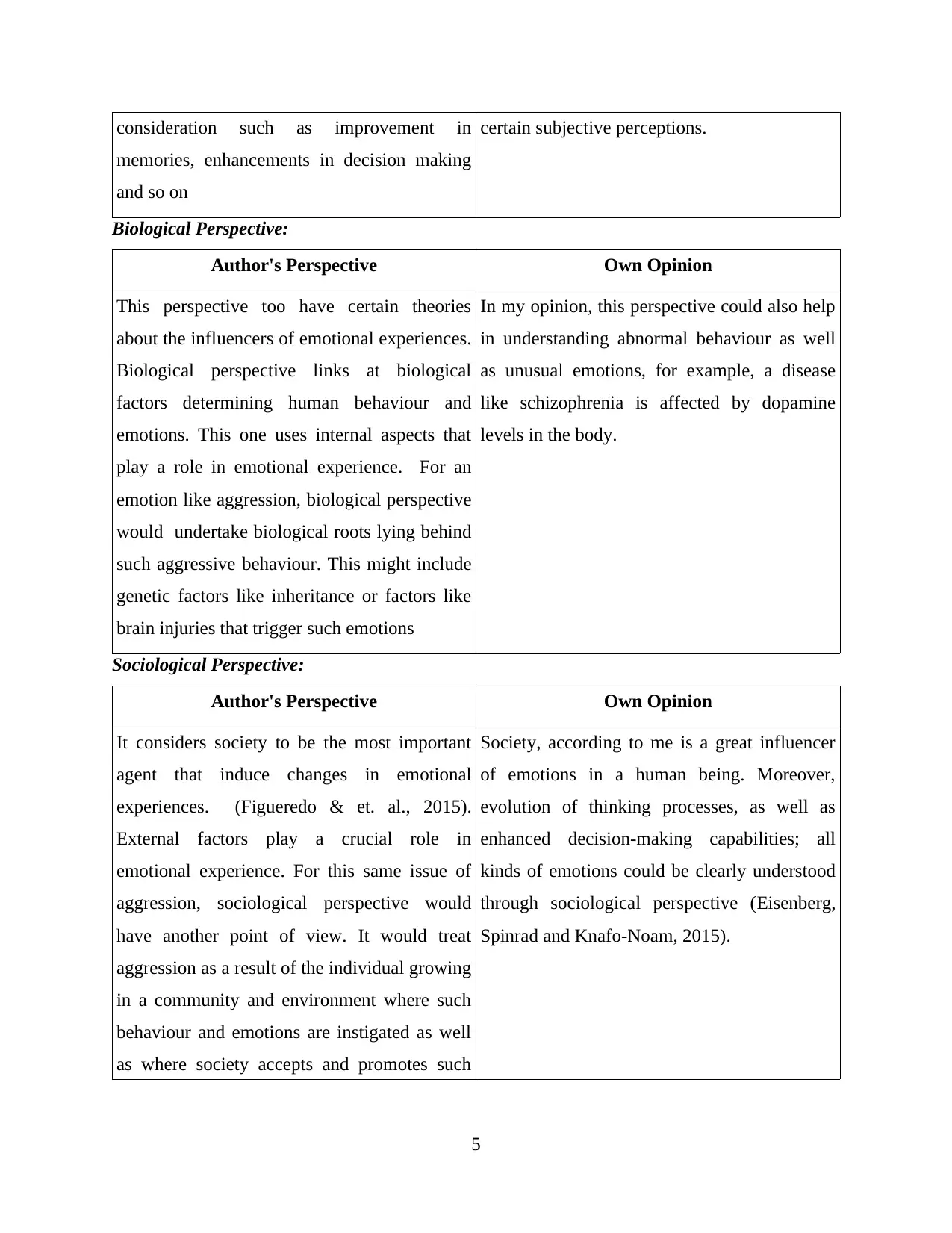
consideration such as improvement in
memories, enhancements in decision making
and so on
certain subjective perceptions.
Biological Perspective:
Author's Perspective Own Opinion
This perspective too have certain theories
about the influencers of emotional experiences.
Biological perspective links at biological
factors determining human behaviour and
emotions. This one uses internal aspects that
play a role in emotional experience. For an
emotion like aggression, biological perspective
would undertake biological roots lying behind
such aggressive behaviour. This might include
genetic factors like inheritance or factors like
brain injuries that trigger such emotions
In my opinion, this perspective could also help
in understanding abnormal behaviour as well
as unusual emotions, for example, a disease
like schizophrenia is affected by dopamine
levels in the body.
Sociological Perspective:
Author's Perspective Own Opinion
It considers society to be the most important
agent that induce changes in emotional
experiences. (Figueredo & et. al., 2015).
External factors play a crucial role in
emotional experience. For this same issue of
aggression, sociological perspective would
have another point of view. It would treat
aggression as a result of the individual growing
in a community and environment where such
behaviour and emotions are instigated as well
as where society accepts and promotes such
Society, according to me is a great influencer
of emotions in a human being. Moreover,
evolution of thinking processes, as well as
enhanced decision-making capabilities; all
kinds of emotions could be clearly understood
through sociological perspective (Eisenberg,
Spinrad and Knafo‐Noam, 2015).
5
memories, enhancements in decision making
and so on
certain subjective perceptions.
Biological Perspective:
Author's Perspective Own Opinion
This perspective too have certain theories
about the influencers of emotional experiences.
Biological perspective links at biological
factors determining human behaviour and
emotions. This one uses internal aspects that
play a role in emotional experience. For an
emotion like aggression, biological perspective
would undertake biological roots lying behind
such aggressive behaviour. This might include
genetic factors like inheritance or factors like
brain injuries that trigger such emotions
In my opinion, this perspective could also help
in understanding abnormal behaviour as well
as unusual emotions, for example, a disease
like schizophrenia is affected by dopamine
levels in the body.
Sociological Perspective:
Author's Perspective Own Opinion
It considers society to be the most important
agent that induce changes in emotional
experiences. (Figueredo & et. al., 2015).
External factors play a crucial role in
emotional experience. For this same issue of
aggression, sociological perspective would
have another point of view. It would treat
aggression as a result of the individual growing
in a community and environment where such
behaviour and emotions are instigated as well
as where society accepts and promotes such
Society, according to me is a great influencer
of emotions in a human being. Moreover,
evolution of thinking processes, as well as
enhanced decision-making capabilities; all
kinds of emotions could be clearly understood
through sociological perspective (Eisenberg,
Spinrad and Knafo‐Noam, 2015).
5
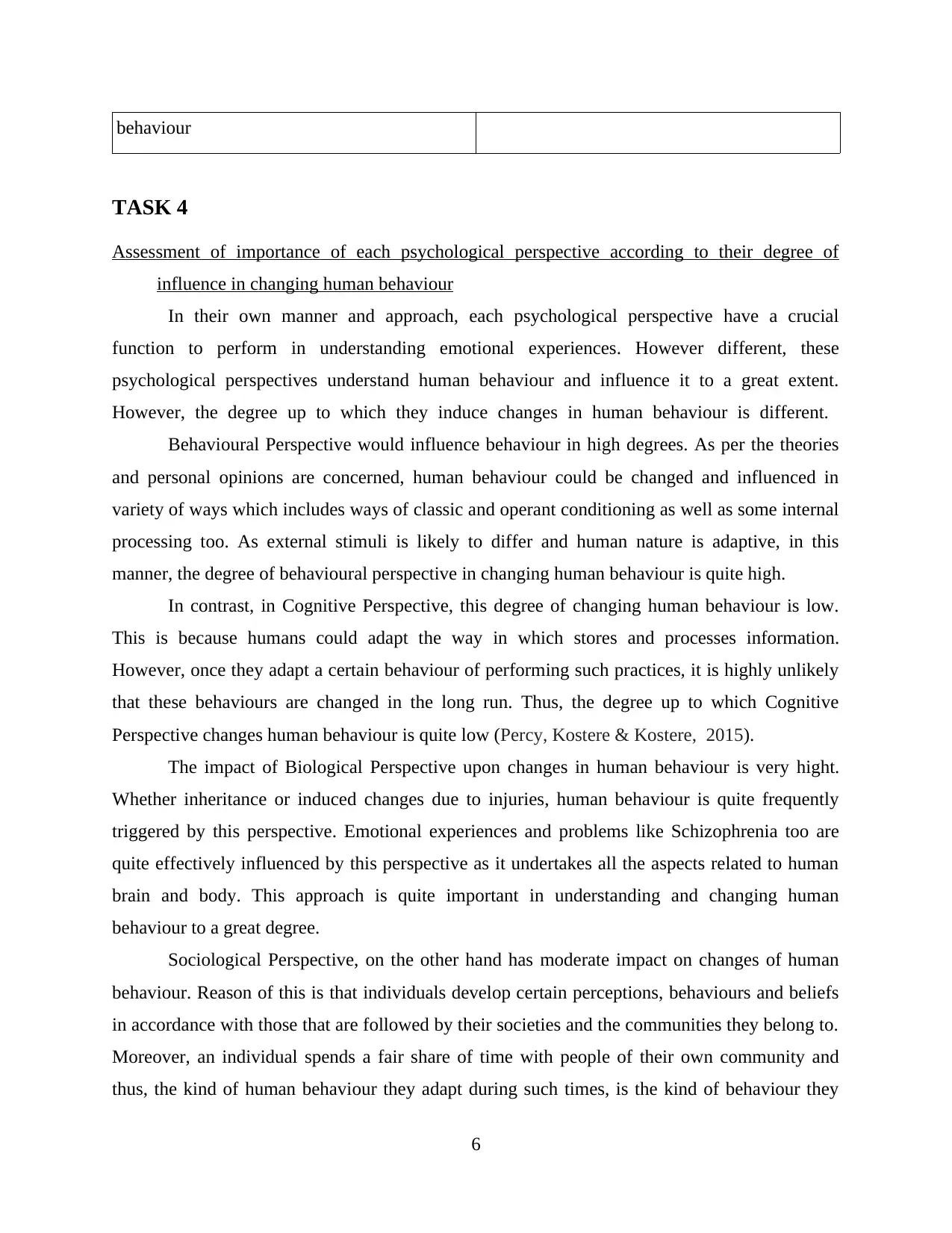
behaviour
TASK 4
Assessment of importance of each psychological perspective according to their degree of
influence in changing human behaviour
In their own manner and approach, each psychological perspective have a crucial
function to perform in understanding emotional experiences. However different, these
psychological perspectives understand human behaviour and influence it to a great extent.
However, the degree up to which they induce changes in human behaviour is different.
Behavioural Perspective would influence behaviour in high degrees. As per the theories
and personal opinions are concerned, human behaviour could be changed and influenced in
variety of ways which includes ways of classic and operant conditioning as well as some internal
processing too. As external stimuli is likely to differ and human nature is adaptive, in this
manner, the degree of behavioural perspective in changing human behaviour is quite high.
In contrast, in Cognitive Perspective, this degree of changing human behaviour is low.
This is because humans could adapt the way in which stores and processes information.
However, once they adapt a certain behaviour of performing such practices, it is highly unlikely
that these behaviours are changed in the long run. Thus, the degree up to which Cognitive
Perspective changes human behaviour is quite low (Percy, Kostere & Kostere, 2015).
The impact of Biological Perspective upon changes in human behaviour is very hight.
Whether inheritance or induced changes due to injuries, human behaviour is quite frequently
triggered by this perspective. Emotional experiences and problems like Schizophrenia too are
quite effectively influenced by this perspective as it undertakes all the aspects related to human
brain and body. This approach is quite important in understanding and changing human
behaviour to a great degree.
Sociological Perspective, on the other hand has moderate impact on changes of human
behaviour. Reason of this is that individuals develop certain perceptions, behaviours and beliefs
in accordance with those that are followed by their societies and the communities they belong to.
Moreover, an individual spends a fair share of time with people of their own community and
thus, the kind of human behaviour they adapt during such times, is the kind of behaviour they
6
TASK 4
Assessment of importance of each psychological perspective according to their degree of
influence in changing human behaviour
In their own manner and approach, each psychological perspective have a crucial
function to perform in understanding emotional experiences. However different, these
psychological perspectives understand human behaviour and influence it to a great extent.
However, the degree up to which they induce changes in human behaviour is different.
Behavioural Perspective would influence behaviour in high degrees. As per the theories
and personal opinions are concerned, human behaviour could be changed and influenced in
variety of ways which includes ways of classic and operant conditioning as well as some internal
processing too. As external stimuli is likely to differ and human nature is adaptive, in this
manner, the degree of behavioural perspective in changing human behaviour is quite high.
In contrast, in Cognitive Perspective, this degree of changing human behaviour is low.
This is because humans could adapt the way in which stores and processes information.
However, once they adapt a certain behaviour of performing such practices, it is highly unlikely
that these behaviours are changed in the long run. Thus, the degree up to which Cognitive
Perspective changes human behaviour is quite low (Percy, Kostere & Kostere, 2015).
The impact of Biological Perspective upon changes in human behaviour is very hight.
Whether inheritance or induced changes due to injuries, human behaviour is quite frequently
triggered by this perspective. Emotional experiences and problems like Schizophrenia too are
quite effectively influenced by this perspective as it undertakes all the aspects related to human
brain and body. This approach is quite important in understanding and changing human
behaviour to a great degree.
Sociological Perspective, on the other hand has moderate impact on changes of human
behaviour. Reason of this is that individuals develop certain perceptions, behaviours and beliefs
in accordance with those that are followed by their societies and the communities they belong to.
Moreover, an individual spends a fair share of time with people of their own community and
thus, the kind of human behaviour they adapt during such times, is the kind of behaviour they
6
⊘ This is a preview!⊘
Do you want full access?
Subscribe today to unlock all pages.

Trusted by 1+ million students worldwide
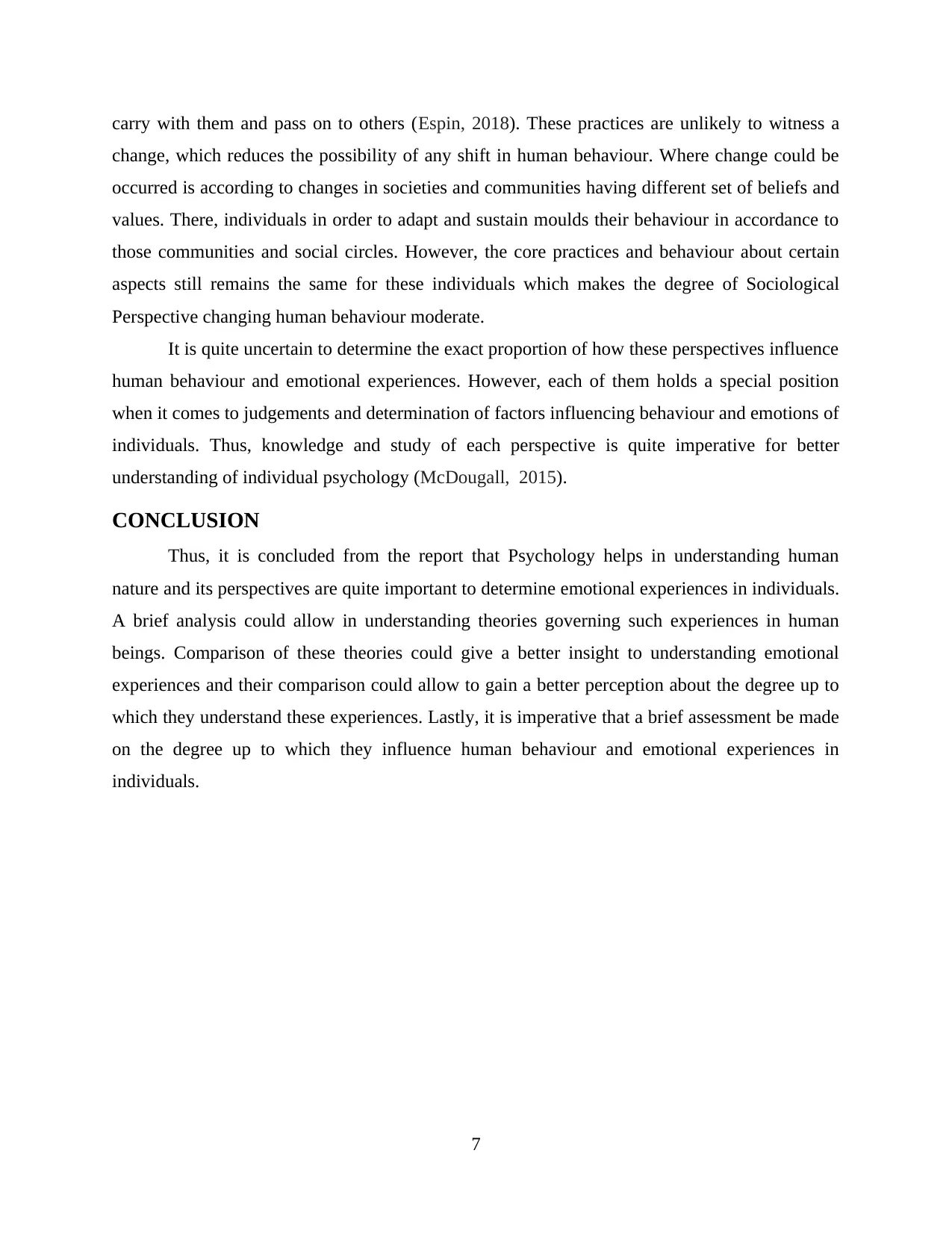
carry with them and pass on to others (Espin, 2018). These practices are unlikely to witness a
change, which reduces the possibility of any shift in human behaviour. Where change could be
occurred is according to changes in societies and communities having different set of beliefs and
values. There, individuals in order to adapt and sustain moulds their behaviour in accordance to
those communities and social circles. However, the core practices and behaviour about certain
aspects still remains the same for these individuals which makes the degree of Sociological
Perspective changing human behaviour moderate.
It is quite uncertain to determine the exact proportion of how these perspectives influence
human behaviour and emotional experiences. However, each of them holds a special position
when it comes to judgements and determination of factors influencing behaviour and emotions of
individuals. Thus, knowledge and study of each perspective is quite imperative for better
understanding of individual psychology (McDougall, 2015).
CONCLUSION
Thus, it is concluded from the report that Psychology helps in understanding human
nature and its perspectives are quite important to determine emotional experiences in individuals.
A brief analysis could allow in understanding theories governing such experiences in human
beings. Comparison of these theories could give a better insight to understanding emotional
experiences and their comparison could allow to gain a better perception about the degree up to
which they understand these experiences. Lastly, it is imperative that a brief assessment be made
on the degree up to which they influence human behaviour and emotional experiences in
individuals.
7
change, which reduces the possibility of any shift in human behaviour. Where change could be
occurred is according to changes in societies and communities having different set of beliefs and
values. There, individuals in order to adapt and sustain moulds their behaviour in accordance to
those communities and social circles. However, the core practices and behaviour about certain
aspects still remains the same for these individuals which makes the degree of Sociological
Perspective changing human behaviour moderate.
It is quite uncertain to determine the exact proportion of how these perspectives influence
human behaviour and emotional experiences. However, each of them holds a special position
when it comes to judgements and determination of factors influencing behaviour and emotions of
individuals. Thus, knowledge and study of each perspective is quite imperative for better
understanding of individual psychology (McDougall, 2015).
CONCLUSION
Thus, it is concluded from the report that Psychology helps in understanding human
nature and its perspectives are quite important to determine emotional experiences in individuals.
A brief analysis could allow in understanding theories governing such experiences in human
beings. Comparison of these theories could give a better insight to understanding emotional
experiences and their comparison could allow to gain a better perception about the degree up to
which they understand these experiences. Lastly, it is imperative that a brief assessment be made
on the degree up to which they influence human behaviour and emotional experiences in
individuals.
7
Paraphrase This Document
Need a fresh take? Get an instant paraphrase of this document with our AI Paraphraser
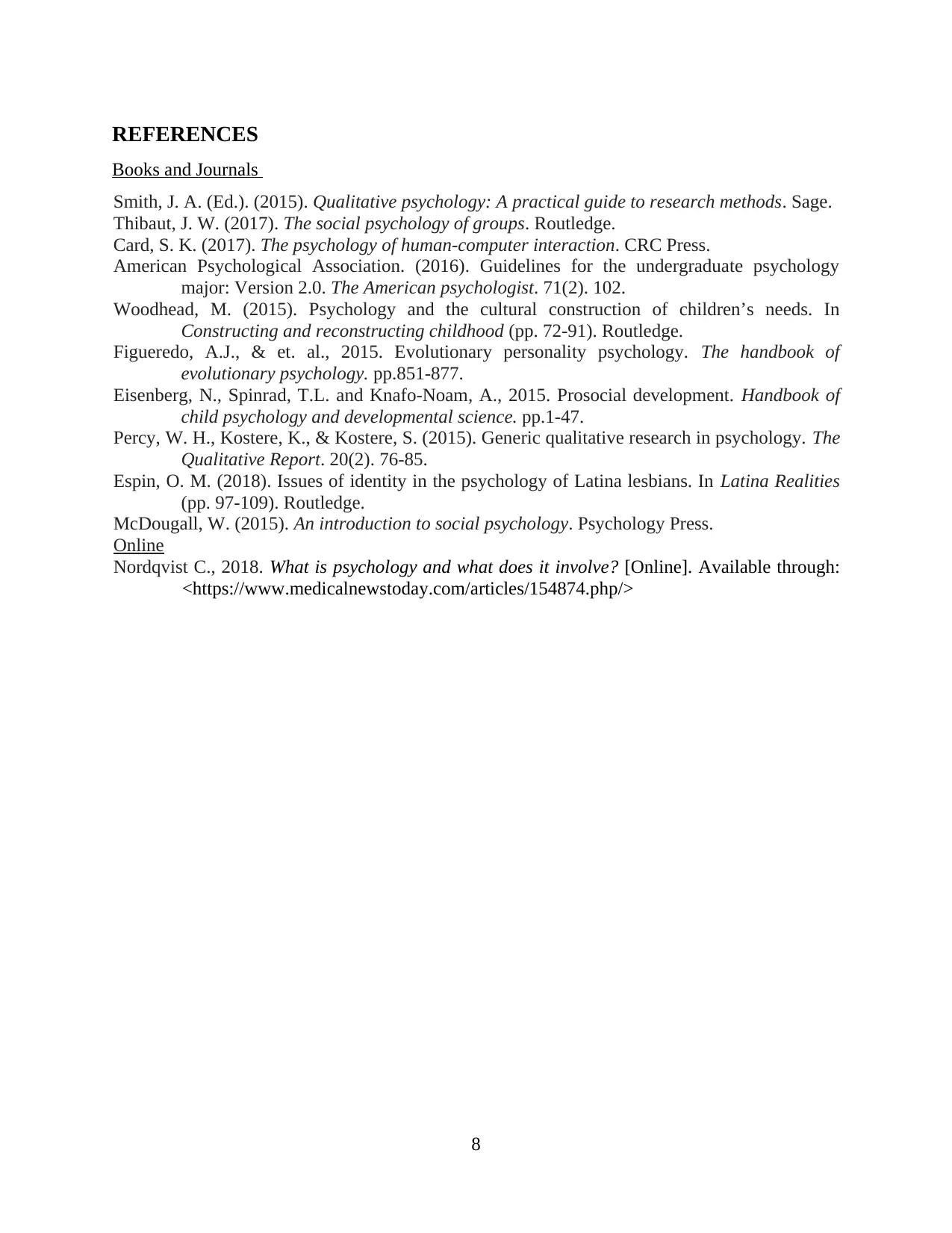
REFERENCES
Books and Journals
Smith, J. A. (Ed.). (2015). Qualitative psychology: A practical guide to research methods. Sage.
Thibaut, J. W. (2017). The social psychology of groups. Routledge.
Card, S. K. (2017). The psychology of human-computer interaction. CRC Press.
American Psychological Association. (2016). Guidelines for the undergraduate psychology
major: Version 2.0. The American psychologist. 71(2). 102.
Woodhead, M. (2015). Psychology and the cultural construction of children’s needs. In
Constructing and reconstructing childhood (pp. 72-91). Routledge.
Figueredo, A.J., & et. al., 2015. Evolutionary personality psychology. The handbook of
evolutionary psychology. pp.851-877.
Eisenberg, N., Spinrad, T.L. and Knafo‐Noam, A., 2015. Prosocial development. Handbook of
child psychology and developmental science. pp.1-47.
Percy, W. H., Kostere, K., & Kostere, S. (2015). Generic qualitative research in psychology. The
Qualitative Report. 20(2). 76-85.
Espin, O. M. (2018). Issues of identity in the psychology of Latina lesbians. In Latina Realities
(pp. 97-109). Routledge.
McDougall, W. (2015). An introduction to social psychology. Psychology Press.
Online
Nordqvist C., 2018. What is psychology and what does it involve? [Online]. Available through:
<https://www.medicalnewstoday.com/articles/154874.php/>
8
Books and Journals
Smith, J. A. (Ed.). (2015). Qualitative psychology: A practical guide to research methods. Sage.
Thibaut, J. W. (2017). The social psychology of groups. Routledge.
Card, S. K. (2017). The psychology of human-computer interaction. CRC Press.
American Psychological Association. (2016). Guidelines for the undergraduate psychology
major: Version 2.0. The American psychologist. 71(2). 102.
Woodhead, M. (2015). Psychology and the cultural construction of children’s needs. In
Constructing and reconstructing childhood (pp. 72-91). Routledge.
Figueredo, A.J., & et. al., 2015. Evolutionary personality psychology. The handbook of
evolutionary psychology. pp.851-877.
Eisenberg, N., Spinrad, T.L. and Knafo‐Noam, A., 2015. Prosocial development. Handbook of
child psychology and developmental science. pp.1-47.
Percy, W. H., Kostere, K., & Kostere, S. (2015). Generic qualitative research in psychology. The
Qualitative Report. 20(2). 76-85.
Espin, O. M. (2018). Issues of identity in the psychology of Latina lesbians. In Latina Realities
(pp. 97-109). Routledge.
McDougall, W. (2015). An introduction to social psychology. Psychology Press.
Online
Nordqvist C., 2018. What is psychology and what does it involve? [Online]. Available through:
<https://www.medicalnewstoday.com/articles/154874.php/>
8
1 out of 11
Related Documents
Your All-in-One AI-Powered Toolkit for Academic Success.
+13062052269
info@desklib.com
Available 24*7 on WhatsApp / Email
![[object Object]](/_next/static/media/star-bottom.7253800d.svg)
Unlock your academic potential
Copyright © 2020–2026 A2Z Services. All Rights Reserved. Developed and managed by ZUCOL.




